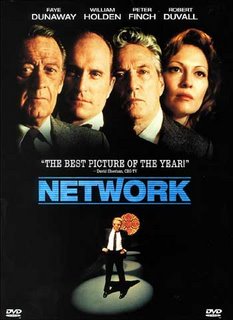
NETWORK, 1976
Network, features a harsh but justified look at the inner workings of the media industry. It reveals the pitfalls and shortcomings of television networks through shedding light on some of the corrupt individuals who form the backbone of the television networks.
The film focuses primarily on Howard Beale, played by Peter Finch, who is a veteran news anchorman for UBS-TV, and is fired because his superiors blame him for the plummeting ratings of the network. Howard transforms himself from a retiring anchorman, insane and threatening suicide, to a celebrated, prophetic talk show host. He does this inadvertently through expressing rage about political atrocities being committed and telling his viewers the stark undisguised truth the way he sees it, on what should’ve been his last show. Due to the mass attention this draws, he is rehired and delivers daily harangues and on his Howard Beale show, becoming an instant celebrity simply for telling people exactly what they want to hear.
However, although Howard is in need of psychiatric treatment, his superiors aren’t mildly concerned to say the least. Their only care is that he earns high ratings and boost shares for the unpopular network. Max Schumacher, one of the few characters who seem to possess any moral convictions, is fired and removed from post because he opposes the industry’s exploitation of Howard.
Max, seems to represent the few individuals with an actual regard for ethics, and morality in the field that get crushed from above do they dare voice any opposition
Diana Christenson, played by Faye Dunaway represents the cold hearted apathetic nature, and relentlessness typical of someone in such a demanding, high-ranking, position in the field, where the only way to succeed is to ensure that your only allegiance is to the industry.
Harold, ironically is used in the film to convey to the people, that news and television is junk; TV is relegated to a mere tube that connects people to tabloids and other cheap means of “news” and entertainment, to keep people from falling into boredom, until they lose all their individuality and cannot think for themselves
The film is inherently dismal and ominous, but at the same time features many elements of humor and comic relief and thus it is enjoyable, as well as intriguing.
The cast does a remarkable job portraying each of the characters, and it is the success of the cast, combined with the incorporation of well created dramatic elements such as satire, allegory, hyperbole, and irony that the film expertly conveys its intended meaning. Although, this film was produced over thirty years, it features a timeless message about the news and the media, and is relevant to our decade more than any other that has preceded it.
No comments:
Post a Comment